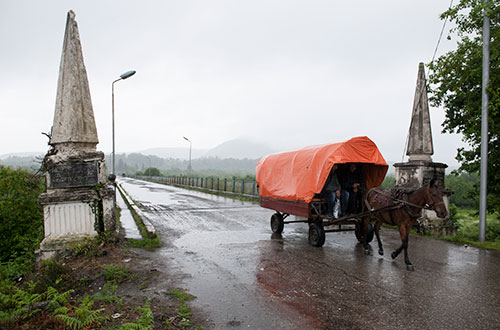| U.S. ‘Deeply Concerned’ by Crossing Points Closure along Abkhazia |
| Civil Georgia, Tbilisi / 7 Mar.'17 / 09:49 |

Enguri bridge, one of the two remaining crossing points between Gali and Zugdidi districts. 2016. Photo: Civil.ge/Eana Korbezashvili
“The United States is deeply concerned by the decision of de facto Abkhaz authorities to close two controlled crossing points along the administrative boundary line of the occupied territory of Abkhazia in Georgia,” State Department Spokesperson Mark C. Toner said in a press statement on March 6.
Authorities in Sokhumi closed two out of four crossing points - Nabakevi-Khurcha and Meore Otobaia-Orsantia - between Abkhazia’s predominantly ethnic Georgian Gali district and its adjoining Zugdidi district of Samegrelo region on March 5.
The U.S. Department of State said that these closures “will further restrict freedom of movement and damage the livelihoods of local residents.”
“Actions such as these not only impose humanitarian hardships on the local population, they also erode the trust and confidence of the people and undermine the Geneva International Discussions, which are the recognized mechanism for discussing security-related issues and humanitarian needs of the conflict-affected population,” it said.
“The United States calls for these crossing points to be re-opened, allowing children to attend school and residents to move freely to engage in commerce, visit relatives, and obtain necessary medical services,” the statement also said.
The State Department Spokesperson reiterated the country’s “full support” to Georgia’s territorial integrity, independence, and sovereignty within its internationally recognized borders.
The decision to close the crossing points, made on December 28 by authorities in Sokhumi, has raised concerns locally and internationally.
Residents of Nabakevi and surrounding villages in Gali district, who used the two crossing points to travel to the neighboring Zugdidi district for schooling, medical services and commercial activities, organized a protest rally against the decision on January 25.
A number of countries and international organizations, including the United Nations, the European Union, NATO, the United States, the United Kingdom, Lithuania and Japan, spoke against the planned closure stressing that it would restrict freedom of movement for locals, including schoolchildren and patients requiring medical treatment.
